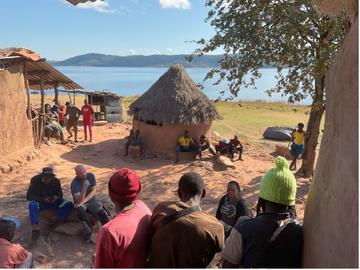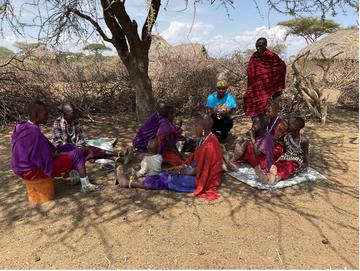Conservation decision makers are often faced with a difficult question: whether to prioritise the interests of people or wild animals, and individual wild animals or groups of animals? Responses to these questions continue to attract much public and scientific debate, especially because the response to these questions may be further complicated by Global North-South divisions.

Members of WildCRUs Morally Contested Conservation project in discussion with community members in Nyaodza fishing village, Kariba northern Zimbabwe
Image: Yolanda Mutinhima
New research from the Morally Contested Research Project suggests that conservation priorities of those in the Global North may override the needs, interests, and concerns of those living in biodiversity rich areas of the Global South. The study used in-person and online questionnaires sent to over 3300 participants to understand the conservation priorities of ten different populations (or ‘publics’) living in rural and urban parts of sub-Saharan Africa, the United Kingdom and the United States.
Unexpectedly, the results revealed more than Global North-South disparities, instead highlighting a deeper divide between those living close to high-biodiversity areas in sub-Saharan Africa (‘locals’) and those living away from these conservation areas (‘distants’).
‘Locals’ were found to more strongly prioritise the interests of people over wild animals, and groups of animals over individual animals. Conversely, ‘distant’ populations in urban sub-Saharan Africa, the UK and US favoured prioritising the interests of wild animals over people, and individual animals over groups of animals. Therefore, differences in conservation priorities can be more accurately classed as ‘local-distant’ rather than Global North-Global South divisions.
Digging deeper into the data, the research team also found that ‘local’ perspectives differed across locations depending on ecological and socio-cultural factors including economic status, exposure to conservation policies, cultural values concerning wildlife, and trust in institutions.
Co-lead researcher Yolanda Mutinhima (Chinhoyi University of Technology) said:
"The future of conservation rests on recognising the diversity of human needs, perspectives, and priorities. Understanding how people living in different places think helps explain why people disagree on conservation objectives and strategies, and is foundational for informed conservation management decisions."

Members of WildCRUs Morally Contested Conservation project conducting questionnaire surveys in the Enduiment wildlife management area, northern Tanzania
Image: Salum Kulunge
These results highlight the importance of understanding how people across societies think about complicated conservation issues and are especially valuable to consider for controversial conservation activities such as culling, hunting, or protected area management. Through a better understanding of views both near and distant to conservation sites, the results of this study demonstrate why some conservation prioritises and activities can be acceptable in some places, but not in others. As such, taking into account the opinions of various ‘publics’ is essential for making international conservation efforts more socially just.
To read more about this research, published in Biology Letters, visit: https://doi.org/10.1098/rsbl.2024.0571